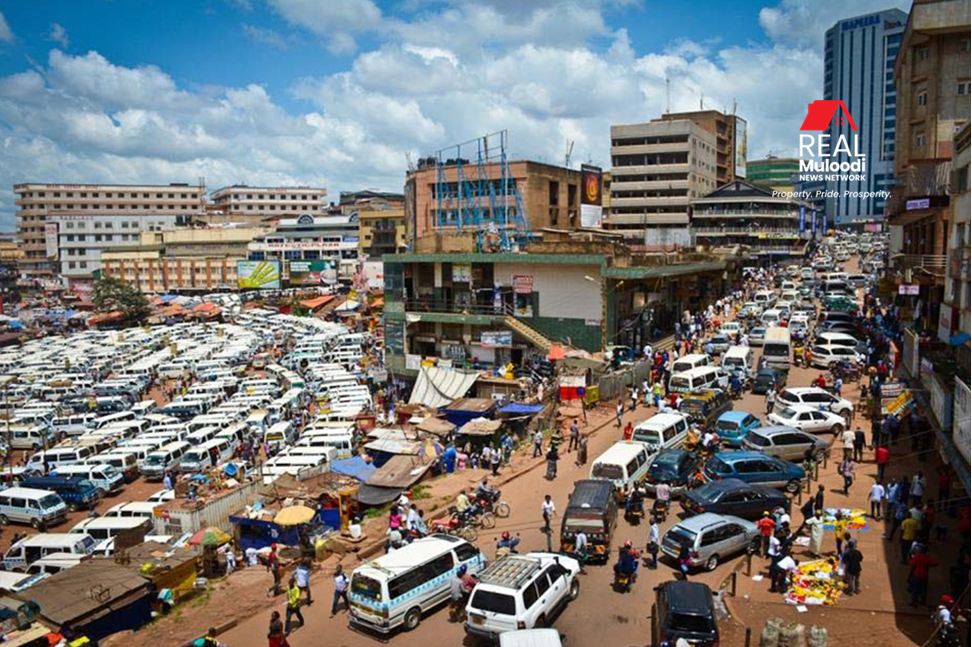UGANDA, Kampala | Real Muloodi News | As Kampala City grows, the need for better infrastructure intensifies.
The city is gradually emerging from the rubble of potholed roads, consistently disorganised planning, and meagre income collections after decades of subpar performance.
Metropolis officials are working quickly to put important physical planning rules into place to guarantee connected neighbourhoods befitting a city.
The metropolitan outskirts are dotted with high-rise structures, which provide a picturesque setting.
The most recent collaboration, the World Bank-funded Kampala Institutional and Infrastructure Development Project (KIIDP), has recently ended. Authorities are also working nonstop to repair roads to bitumen standards.
Makerere Hill, John Babiha (Acacia) Nakawa-Ntinda, Lukuli, Kabusu-Bunamwaya-Lweza, and the Berkley (Bakuli) – Nakulabya-Kasubi section of Hoima Road are a few of the roads that have received improvements under the KIIDP.
However, only 700 km of the 2,100 km of city roads are paved, leaving the remainder with potholes.
Fairway, four intersections on Makerere Hill Road, three intersections on Kira Road, the Bwaise-Mambule intersection on Mambule Road, and three intersections on Hoima Road at Berkeley (Bakuli)-Nakulabye are among the signalised intersections.
In Kampala, there is a non-motorized transportation corridor on Luwum Street.
The drainage canals Lubigi and Nakamiro are now being renovated, and others are planned.
The government, according to Mr David Luyimbazi, the Deputy Executive Director of the Kampala Capital City Authority (KCCA), has a lot to show.
One of their hallmark projects, according to Mr Luyimbazi, is the upgrading of the city’s road and drainage network.
“We plan to revamp the entire city infrastructure in terms of upgrade and expansion of roads and drainages, improvement of the transport sector and proper structural planning. These problems have bedeviled the city for so long but I am happy to note that we have made great steps in improving the city’s infrastructural development,” he says.
According to Mr Luyimbazi, the Greater Kampala Urban Development Programme (GKUDP) and the Kampala City Annuity Roads and Bridge Project are the two projects being carried out by KCCA (KCARBP).
GKUDP, a five-year initiative (2022–2027) with a total funding of Shs917 billion, aims to alter Kampala, Wakiso, and Mukono in terms of mobility, accessibility, resilience, employment, slum upgrading, and affordable housing, among other things.
At least 270km of roads will be rebuilt as part of the KCARBP, which is funded by the UK government with $250m (Shs949.2b). Additionally, four flyover bridges for walkers and one important bridge for cars will be built.
To make it easier for motorcyclists and pedestrians to move throughout the city, authorities are also preparing to introduce new non-motorised transit lanes.
A 2-kilometre non-motorised transportation corridor was presented by KCCA in 2019 as a trial project. It runs from Entebbe Road via Luwum Street down to Namirembe Road and Berkeley (Bakuli) junction.
Experts contend that new non-motorized transportation routes across the five city divisions are required due to the growing city population, where the majority of people walk to work.
Budget issues, however, are still a problem for the city and have stalled several infrastructure projects.
Experts claim that the KCCA’s present meagre USh300 billion yearly budget is insufficient to address the city’s pressing problems.
Due to a lack of funding to carry out the plan, it has been put on hold. To implement it, KCCA would require at least USh7.5 trillion.
Additionally, due to a lack of funds, the transportation and street lighting master plans that were released roughly four years ago are still just on paper.
Following the five-year strategic plan, KCCA aims to introduce cable cars, a bus transportation system, and smart parking, which allows residents of the city to download street parking applications on their smartphones to find available parking.
To provide a secure and environmentally sustainable transportation system, the plan also calls for the streamlining of taxis and Boda Bodas as well as the construction of parking spaces and terminals.
The strategic plan also calls for transforming slums into contemporary neighbourhoods with amenities like high-rise flats to house slum residents.
“We are lobbying the government to increase our budget so that we can accomplish the already planned infrastructure projects. We are doing our best to improve the city despite the small resource envelope and the good news is that the government has promised to address our financial challenges. We would like to give the city a new outlook and make it both attractive and livable,” Mr Luyimbazi says.
Doreen Nyanjura, the Deputy Lord Mayor of Kampala, blames the government’s meagre financial assistance for the city’s delayed progress.
Given that the city generates almost 60% of the nation’s Gross Domestic Product, Ms Nyanjura contends that the city should get at least 1% of the whole national budget (GDP).
“Funding has been our biggest challenge as an authority but the government isn’t bothered at all and that is why you see that we have failed to implement some of our critical infrastructural projects. At 60 years, the country’s capital city is still lagging in terms of infrastructural development. We need to do better as a city if we are to match other cities in the region,” she says.
According to Ms Nyanjura, the administration has resisted their attempts as legislators to reorganise the city through legislation.
“We have come up with ordinances on issues like transport, markets, and transport in vain. Our approach has always been to have an inclusive development which doesn’t violate the rights of the city dwellers because once we don’t plan for such people then they will remain a challenge to the city,” she says.
According to Ms Nyanjura, financing the delayed infrastructure projects should be prioritised for the city to experience progress.
ADVERTISEMENT:
READ MORE LIKE THIS:
Kampala Lord Mayor Erias Lukwago: More Funding Needed to Transform Kampala City
MPs Want Increase Funding to Local Governments for Road Maintenance




